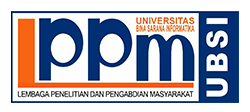DIVERSIVIKASI PRODUK DAN EFISIENSI BISNIS DALAM KEBERLANJUTAN GREEN HOTEL PADA ERA NEW NORMAL DI HYATT REGENCY YOGYAKARTA
Sari
ABSTRAK
Dampak Covid 19 yang dirasakan dibidang perhotelan memaksa pihak hotel untuk melakukan hemat energi dan biaya. Penelitian ini bertujuan untuk mengetahui diversivikasi produk dan efisiensi bisnis dalam keberlanjutan green hotel pada era new normal di Hyatt Regency Yogyakarta. Penelitian ini menggunakan metode kualitatif dengan teknik pengumpulan data observasi, wawancara, dokumentasi dan study Pustaka. Keberlanjutan green hotel di hyatt Regency dilakukan dengan diversivikasi produk dan efisiensi bisnis. Diversivikasi produk di Hyatt Regency yaitu Merancang working space (Work From Hyatt), Summer camp untuk anak anak, walk the dog, menjual swimming poll untuk tamu di luar Hyatt. Diversivikasi produk tersebut dijalankan dengan ketentuan wajib mengkonsumsi food atau beverage di Hyatt Hotel minimal Rp. 100.000,- per peserta, Bekerjasma dengan grab wheels, konsep angkringan yang higienis, sehat, murah dan enak, serta melakukan efisiensi bisnis dengan menghemat energi listrik tanpa mengurangi pelayanan ke tamu dengan cara mengarahkan listrik kamar dengan gantungan kunci, sehingga jika tamu mengambil kartu kunci sebagian besar listrik peralatan akan mati secara otomatis, mengarahkan dispenser semua area, ke sakelar lampu, sehingga ketika mematikan lampu kantor akan otomatis mematikan dispenser, meminimalkan penggunaan kertas dan menggunakan kertas daur ulang, membangun kesadaran untuk program menabung energi melalui poster dan juga kampanye, menggunakan ecowasher untuk toilet, menggunakan lampu LED, menggunakan digital Thermostat, memasang pengatur waktu untuk penerangan area publik, memasang tab air otomatis di ruang makan karyawan, memasang pengatur waktu untuk instalasi pengolahan air limbah, menggunakan topside gas LPG Bulk, memasang arduino untuk mengatur pompa air portabel berjalan, dan pengaturan sauna.
Kata kunci: Diversivikasi produk, Efisiensi Bisnis, Green Hotel
ABSTRACT
Abstract- The impact of Covid 19 felt in the hospitality sector forced the hotel to save energy and costs. This study aims to determine product diversification and business efficiency in the sustainability of green hotels in the new normal era at Hyatt Regency Yogyakarta. This study uses qualitative methods with data collection techniques of observation, interviews, documentation and literature study. The sustainability of the green hotel at Hyatt Regency is carried out by product diversification and business efficiency. Product diversification at Hyatt Regency is Designing a working space (Work From Hyatt), Summer camp for children, walk the dog, selling swimming polls for guests outside the Hyatt. The product diversification is carried out with the condition that it is mandatory to consume food or beverage at the Hyatt Hotel at least Rp. 100,000 per participant, Collaborating with grab wheels, the concept of angkringan that is hygienic, healthy, cheap and delicious, and conducts business efficiency by saving electrical energy without reducing service to guests by directing the room electricity with a key chain, so that if guests take key cards most of the the electricity of the equipment will turn off automatically, directing the dispenser of all back office areas to the light switch, so that when turning off the office lights it will automatically turn off the dispenser, minimizing paper use and using recycled paper, building awareness for energy saving programs through posters and campaigns, using ecowasher for toilets, using LED lights, using digital thermostats, installing timers for lighting public areas, installing automatic water tabs in employee dining rooms, installing timers for wastewater treatment plants, using topside LPG Bulk gas, installing arduino to regulate portal water pumps buzzer running, and sauna setting.
Keywords: Product diversification, Business Efficiency, Green Hotel
Kata Kunci
Teks Lengkap:
PDFReferensi
DAFTAR PUSTAKA
Atmoko, Presetyo Hadi & Heni, Widyaningsih. 2018. Manajemen dan Bisnis Perhotelan. Yogyakarta: Explore.
Baiquni, M, 2001, Participatory Rural Appraisal Pendekatan dan Metode Partisipatif Dalam Pengembangan Masyarakat, Yayasan Pembangunan Berkelanjutan / YPB, Jakarta
Baum, W. M. 2017. Understanding behaviorism: Behavior, Culture, and Evalution (Third Edition).
Cresswell J. 2016. Research Design Pendekatan Metode Kualitatif, Kualitatif, dan campuran. Edisi 4 (terjemahan). Pustaka pelajar: Yogyakarta.
Han, H. and Kim, Y. 2010. “An investigation of green hotel customers’ decision formation: Developing an extended model of the theory of planned behavior”, International Journal of Hospitality Management, Vol 29, No 4, pp.659-668.
Han, H. and Ryu, K. 2012. “The theory of repurchase decision-making (TRD): Identifying the critical factors in the post-purchase decision-making process”, International Journal of Hospitality Management, Vol 31, No 3, pp.786-797.
Moleong, LJ. 2013. Metode Penelitian Kualitatif. Edisi Revisi. Remaja rosda Karya: Bandung.
GHA. (2009), “What are Green Hotels?” Available at: HTTP:// www.greenhotels.com (accessed 12 Nov, 2016).
Graci, S. and D, Rueizs. 2009. Why Go Green? The Business Case for Environmental Commitment in the Canadian Hotel Industry Anatolia.International Journal of Tourism and Hospitality Research, vol. 19(2), 250-270.
Millar, M., Mayer, K.J. and Baloglu, S. 2012. “Importance of green hotel attributes to business and leisure travellers”, Journal of Hospitality Marketing & Management, Vol 21, No 4, pp.395-413.
Peraturan Menteri Pariwisata dan ekonomi Kreatif. Republik Indonesia,nomor PM. 53/HM.001/MPEK/ 2013, Tentang Standar Usaha Hotel. Jakarta : Kementerian Pariwisata dan ekonomi Kreatif Republik Indonesia.
Pizam, A. .2009. “Green Hotels: A fad, ploy or a fact of life?”, International Journal of Hospitality Management, Vol 28, No 1, p.1.
.
Setiawati, CI. 2014. Model Hotel Berwawasan Ramah Lingkungan. Banking and Management Review. Vol.3 (20). 378-391.
Singh. P. B, Dr.Kamal K. Pandey . 2012.Greenmarketing:Policiesandpractices For Sustainabledevelopment. A Journal Of Management. Volume 5, No. 1pp 22-30
Sloan, P. Legrand, Willy and Chen, Joseph S. 2013. Sustainability in the HospitalityIndustry: Principles Sustainable Operations, (2nd Edition). New York: Routledge.
Webster, K. 2006. Environmental Management in the Hospital Industry: A Guide for Students and Managers. London, UK: Thomson Learning
.
DOI: https://doi.org/10.31294/par.v8i2.11505










